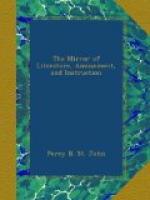Convenient Deafness.—A few days since at the Court of Assizes, in Paris, a M. Lecluse, who was summoned on the jury, produced a certificate that he was deaf, and consequently unable to serve. The Advocate General was observing to the court, in no very elevated tone of voice, that the certificate was inadmissible, since it bore date so far back as June 24, 1813, when M. Lecluse immediately set him right by stating that the date was July 13, instead of June 24, 1813. This at once decided the question, as it proved the acuteness of his hearing, and the Court ordered him to be sworn.
Walnut Water.—Dr. Sully, of Wiveliscombe, a very eminent medical practitioner, in a letter to the editor of the Taunton Courier, has communicated the mode of preparing this article, which has been found so effectual a remedy in subduing nausea and vomiting:—“Take a quarter of a peck of walnuts at the time they are fit for pickling; bruise them, and, with four ounces of fresh angelica seeds, put them into an alembic, with a bottle of French brandy, and enough water to prevent empyreuma, or burning; distil from this mixture a quart, which is called walnut water, and administer a wineglass-full to the patient, to be repeated every half-hour till the vomiting ceases.” Dr. Sully says that he communicated this recipe to Sir Astley Cooper and Mr. Abernethy, both of whom frequently used it in their practice, and that it has been prepared by a house in London for him for the last 40 years.—Morning Herald.
The first Review.—Reviews of books originated in the Journal des Scavans, projected by Dennis de Sallo, in 1664.
Hint to Tea Makers.—Put a small quantity of carbonate of soda into the pot along with the tea, and this, by softening the water, will accelerate the infusion amazingly. Should the water be hard, it will increase the strength of your tea at least one half.—Mechanics’ Magazine.
It is a curious fact, that the Chinese make no use of milk, either in its liquid state, or in the shape of curds, butter, or cheese.
Chairing Members of Parliament.—This custom was taken from the practice in the northern nations, of elevating the king after his election, upon the shoulders of the senators. The Anglo-Saxons carried their king upon a shield when crowned. The Danes set him upon a high stone, placed in the middle of twelve smaller. Bishops were chaired upon elections, as were abbots and others.
Illumination was formerly common not only upon occasions of joy, but even the return home of the master of the house. Some writers have contended, but evidently by mistake, that it was only a part of religious ceremonies. It is even mentioned in Ossian’s Carthon, and obtained in the middle ages. The classical illuminations were made not only with lamps, but links, and wax flambeaux.




